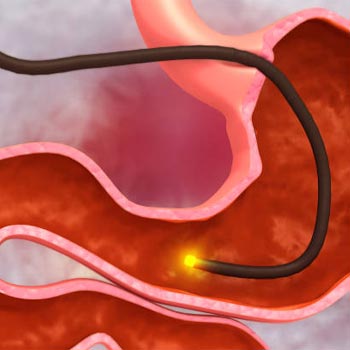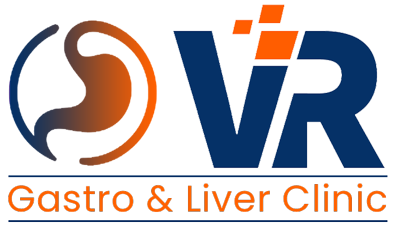What is upper gastrointestinal endoscopy or esophagogastroduodenoscopy (EGD)?
Upper Gastrointestinal Endoscopy, commonly referred to as Upper GI Endoscopy or Esophagogastroduodenoscopy (EGD), is a minimally invasive diagnostic procedure that enables direct visualization of the upper part of the gastrointestinal tract. This includes the esophagus, stomach, and the first segment of the small intestine (duodenum).
During the procedure, the gastroenterologist in vijayawada uses a sophisticated instrument called an endoscope—a flexible tube with a high-resolution camera and light at its tip, this allows for detailed, real-time images of the internal lining of your upper GI tract, helping in the early detection and treatment of various conditions.
Experience precision care with the best gastric doctor in vijayawada
At VR Gastro & Liver Clinic, we specialize in providing comprehensive care for digestive health. Led by Dr. Veera Abhinav Chinta, a renowned medical gastroenterologist in Vijayawada, our clinic offers expert Upper GI Endoscopy (EGD), a crucial procedure for diagnosing and managing various upper digestive tract disorders.

Why is upper GI endoscopy performed?
Upper GI Endoscopy is a vital tool in gastroenterology, offering invaluable insights into the health of your upper digestive system. gastroenterologist doctor in vijayawada may recommend this procedure to:
- Diagnose persistent symptoms: persistent heartburn, acid reflux, nausea, vomiting, or unexplained weight loss could be signs of underlying conditions like GERD, gastritis, or ulcers.
- Investigate swallowing difficulties (dysphagia): difficulty in swallowing could be related to esophageal strictures, inflammation, or tumors.
- Identify causes of upper abdominal pain: chronic upper abdominal pain may be indicative of ulcers, gallbladder disease, or pancreatitis.
- Detect infections and inflammations: conditions like esophagitis, gastritis, and duodenitis can be accurately diagnosed and treated.
- Screen for cancer: endoscopy is crucial for early detection of esophageal or stomach cancer, significantly improving treatment outcomes.
- Evaluate digestive tract bleeding: if you have symptoms of bleeding, such as black or tarry stools, endoscopy can identify the source and allow for immediate treatment.
- Monitor chronic conditions: for patients with known gastrointestinal conditions like barrett’s esophagus or celiac disease, regular endoscopy helps in monitoring disease progression and treatment effectiveness.
How to prepare for esophagogastroduodenoscopy(EGD) in vijayawada?
Proper preparation is essential for the success of the procedure. Dr. Veera Abhinav Chinta and his team will provide you with detailed instructions before your endoscopy, which may include:
- Fasting: you will be required to fast for at least 6-8 hours before the procedure. This ensures your stomach is empty, allowing for a clear view during the examination.
- Medication adjustments: certain medications, especially blood thinners, may need to be adjusted or paused. Please inform Dr. Veera Abhinav Chinta about all medications you are taking.
- Health history review: a thorough review of your medical history, including any allergies, previous surgeries, and existing conditions, will be conducted to ensure your safety.
What to expect during the procedure?
This is a straightforward and usually well-tolerated procedure. Here’s what you can expect:
- Sedation: to ensure your comfort, you will receive a sedative through an IV. This will help you relax and may cause you to feel drowsy during the procedure.
- Procedure: gastroenterology specialist in vijayawada will gently insert the endoscope through your mouth, guiding it down your throat into the esophagus, stomach, and duodenum. The camera at the tip of the endoscope transmits high-definition images to a monitor, allowing for a thorough examination.
- Duration: the entire procedure typically lasts between 15 to 30 minutes.
- Biopsy: if necessary, may take small tissue samples (biopsies) from suspicious areas for further laboratory analysis.
Post-procedure care and recovery
After the endoscopy, you will be monitored in a recovery area until the effects of the sedation wear off, which usually takes about 30 to 60 minutes. You may experience mild side effects such as:
- A sore throat or hoarseness
- Bloating or mild cramping
- Drowsiness from the sedative
These symptoms are generally temporary and should resolve within a day. Gastroenterology doctors in vijayawada will discuss the findings of your endoscopy with you, including any follow-up care or treatment that may be required. If a biopsy is taken, the results will be available within a few days.
Why choose VR Gastro & Liver Clinic for upper GI endoscopy?
- Highly skilled gastroenterologist: Dr. Veera Abhinav Chinta is one of the leading gastroenterologist in vijayawada, with extensive experience in performing upper GI endoscopy and managing complex digestive disorders.
- State-of-the-art technology: best gastroenterology clinic in vijayawada is equipped with the latest endoscopic technology, ensuring accurate diagnosis and effective treatment.
- Personalized patient care: we prioritize your comfort and well-being, offering personalized care and detailed guidance throughout the entire process.
- Comprehensive digestive health services: in addition to esophagogastroduodenoscopy (EGD), we offer a full spectrum of services to address all aspects of digestive health.
Book your upper GI endoscopy with the best endoscopy doctor in vijayawada
If you are experiencing symptoms such as persistent heartburn, abdominal pain, or difficulty swallowing, don't delay in seeking medical attention. Early diagnosis and treatment can prevent more serious complications. Contact the best gastroenterologist in vijayawada Dr. Veera Abhinav Chinta to schedule esophagogastroduodenoscopy (EGD)
